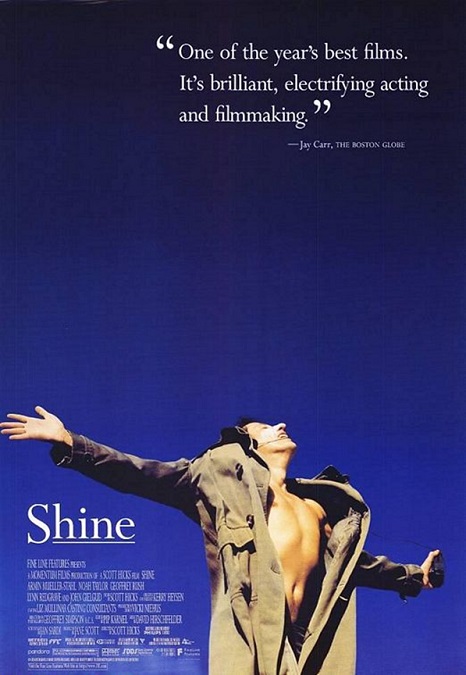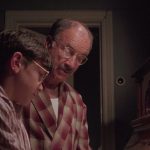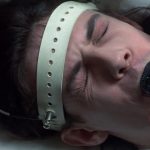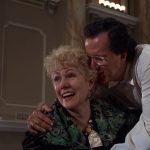
Shine – 1996
This was an OK drama with some pretty spot-on acting by Geoffrey Rush, Armin Mueller-Stahl, Noah Taylor, Googie Withers, Sir John Gielgud, and Vanessa Redgrave. The main plot is a biography of the famous Australian concert pianist, David Helfgott, played by Rush. However, he is afflicted with a mental illness, schizoaffective disorder, which, according to Wikipedia, may include symptoms like delusions, hallucinations, elevated or irritable mood, grandiosity (inflated self-esteem), agitation, risk-taking behavior, decreased need for sleep, poor concentration, rapid speech, and racing thoughts. This is what Rush had to portray.
And he certainly played it well. He was good enough to take home the Academy Award for best Actor. But then again, I’ve never seen Geoffrey Rush do a poor job in any film. Mueller-Stahl also turned in a good performance, as did Redgrave in her fairly small roll. As a matter of fact, now that I’m thinking about it, Rush’s part was not as big as I assumed it would be. The film was a fictionalized biography. The first two thirds of the movie covered his formative years from around age 8 or so until his completely glossed over induction into a mental institution at roughly age 23. Rush was only really prominent in a little over a third of the film.
The rest of the time, the teenage David was played by Noah Taylor. And I have to say that the film’s more dramatic moments were carried out by Taylor. He covered the violent interactions with his abusive father, Peter, played by Mueller-Stahl, and the more personal scenes with three of his beloved mentors, Mr. Rosen, played by Nicholas Bell, Katherine Prichard, played by Googie Withers, and at the Royal College of Music in London, Cecil Parks, played by John Gielgud. Taylor also played the fateful Rachmaninoff Concerto no. 3 scene which culminates in the somehow dangerous piece of music shattering his fragile emotional state.
Honestly, the scene was very dramatic, but it was a little heavy handed. Let me explain. Throughout the film, David and his father keep trying to get someone to teach him the Rach 3, as they called it. But everyone kept refusing to teach him, saying that he was not ready, as if to say the music was too emotionally demanding for him, it could kill him. Huh? But then when allowed to choose his own music, he attempts the Rach 3, like it is a daredevil stunt that presented a physical danger.
But I guess he should have listened. The 19 year old David performs the piece as if he was channeling Rachmaninoff, himself. The scene is overly-dramatized as if he is losing his sanity in the highly emotional music, but cannot stop himself. By the end, he is drenched in sweat, his hair hanging in his face. He plays his final chord and the audience is on their feet, cheering wildly. David stands up and collapses onto the stage, his mind completely gone.
The film then spends only a minute or two showing that David is in a mental institution, receiving electric shock therapy. Suddenly, ten years have passed, and Geoffrey Rush has taken over the part. From then on, the character is nothing but clearly mentally unstable, talking so quickly and incoherently, that it is often difficult to understand him, though I’ll fully admit that Rush played it well. David’s marriage to his wife Gillian, played by Redgrave, and his return to the stage as a concert pianist, almost seemed like an afterthought. It happened very quickly and very little attention was given to their meeting or to developing their relationship. Redgrave did a good enough job, but there just wasn’t much for her to do.
Now, of course, I did a little reading and found that the authenticity of some parts of the film are in question. Most of this controversy is centered around the character of Peter Helfgott. In the film, he was portrayed as the cause of all of David’s mental instability. He was cruel and abusive, had no tolerance for failure or disobedience, and held the boy and his talent under an iron thumb. But members of the real Helfgott family were sorely offended by this inaccurate portrayal. They say that Peter was a kind man who only held David back out of concern for his young age and fragile emotional health. The real David’s mother has been quoted as saying that the film haunted her, and she felt that that “an evil had been done.” But the filmmakers stand by their work, saying that David’s own recollections were accurately taken into account, as were those of every interviewee who had a professional or musical connection with David when he was young.
And in closing I also have to concede the point that the movie is universally considered to be fictional in a single major detail. Helfgott is not as good as the movie makes him out to be. Yes, he was a child prodigy, and yes, until he tragically fell under the influence of his mental illness, his teachers all thought of him as exceptionally gifted. But the movie would have us believe that he is currently on par with the greatest pianists in history like Rubinstein or Horowitz, but from what I have heard from people who have seen him live in concert and from what I have read from music critics, his playing now leaves a lot to be desired. The film calls Helfgott a genius but the critics all seem to disagree.








